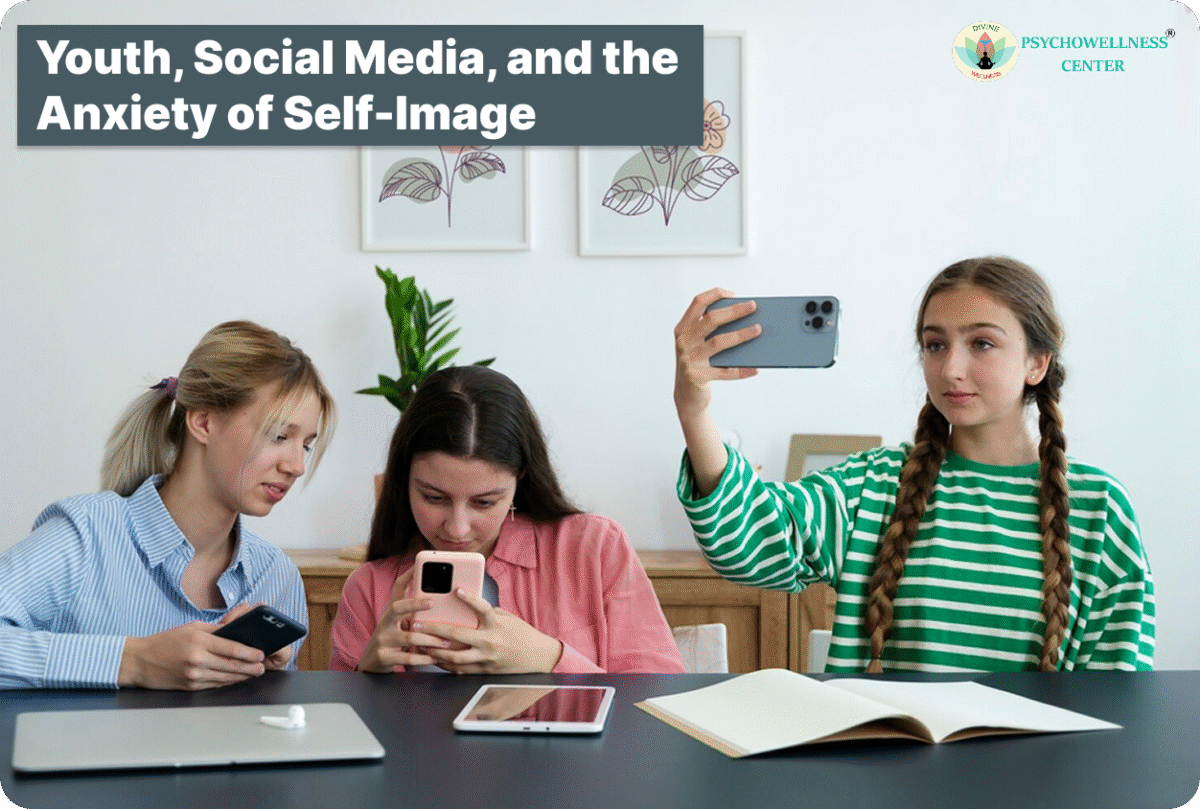In today’s hyperconnected world, social media has become a central part of youth culture. Platforms like Instagram, Snapchat, and YouTube offer opportunities for creativity, self-expression, and social connection. However, they also bring an intense focus on appearance, lifestyle, and social validation factors that significantly impact mental health. For young people navigating adolescence and early adulthood, social media can contribute to anxiety, self-doubt, and distorted self-image.
The Psychology Behind Social Media and Self-Image
From a psychological perspective, self-image refers to the way individuals perceive themselves, including their abilities, appearance, and social worth. For youth, self-image is still developing, making them highly sensitive to social feedback. Social media platforms amplify this sensitivity by creating constant opportunities for comparison.
Research in developmental psychology indicates that social comparison theory the tendency to evaluate oneself against others can become magnified online. Seeing peers or influencers portray curated, idealised versions of life may lead to feelings of inadequacy, lower self-esteem, and social anxiety. In India, where societal and familial expectations often intersect with social media exposure, this effect can be even more pronounced.
Common Manifestations of Social Media-Related Anxiety
- Fear of Missing Out (FOMO): Youth may feel anxious when they perceive others as leading more exciting or successful lives.
- Body Image Concerns: Filtered selfies and idealised body standards can contribute to body dissatisfaction, eating disorders, and low self-esteem.
- Validation Dependence: Constantly seeking likes, comments, and shares can make self-worth contingent on online feedback.
- Cyberbullying and Peer Judgment: Negative comments, trolling, or online exclusion exacerbate stress and emotional distress.
Psychologists note that these patterns can trigger generalised anxiety, depressive symptoms, and emotional dysregulation in young people, creating a cycle of stress and self-criticism.
The Role of Indian Cultural Context
In India, social media anxiety intersects with traditional societal pressures. Academic achievement, family expectations, and social reputation remain significant sources of stress for youth. When social media amplifies the perception of peers’ success or physical perfection, it can heighten performance anxiety and social comparison.
For instance, urban Indian teenagers often report feeling pressure to look and act like influencers while also meeting parental expectations in academics or career planning. This dual burden can intensify self-doubt, identity confusion, and performance anxiety, highlighting the need for supportive interventions.
Strategies to Foster Healthy Social Media Habits
While social media is not inherently harmful, young people and their caregivers can take proactive steps to protect mental health:
- Digital Awareness: Understanding the curated nature of online content helps youth avoid unrealistic comparisons.
- Mindful Consumption: Limiting screen time, unfollowing triggering accounts, and taking social media breaks reduce anxiety.
- Promoting Self-Compassion: Encouraging youth to value effort and authenticity over likes and followers fosters emotional resilience.
- Parental and Peer Support: Open conversations about social media pressures and emotional well-being normalise struggles and reduce isolation.
- Professional Support: Youth experiencing significant anxiety or depressive symptoms can benefit from online counselling through TalktoAngel or offline therapy at Psychowellness Centre, where trained psychologists provide coping strategies and personalised guidance.
The Positive Side of Social Media
It’s important to note that social media is not purely detrimental. When used mindfully, it can:
- Encourage self-expression through art, writing, or video creation
- Foster supportive peer communities
- Provide mental health resources and awareness campaigns
- Allow youth to explore identity and creativity in safe, moderated spaces
The key lies in balanced usage, where online engagement does not replace real-life social interaction or emotional processing.
Conclusion
Social media is a double-edged sword for today’s youth: it offers connection, creativity, and self-expression, yet it also heightens comparison, insecurity, and anxiety about self-image. For young people already balancing academic pressure, family expectations, and social demands, these digital stressors can greatly amplify emotional overwhelm.
Promoting digital mindfulness, self-compassion, healthy boundaries, and supportive peer and family environments can help youth use social media more consciously and strengthen their emotional well-being. But when anxiety, self-doubt, or identity concerns start to interfere with daily life, professional support becomes essential.
For young individuals struggling with stress, anxiety, or emotional imbalances resulting from social media pressure, comparison, or online harassment, the Psychowellness Center, located in Dwarka Sector-17 and Janakpuri, New Delhi (011-47039812 / 7827208707), offers youth-focused counselling and emotional wellness programs aimed at strengthening self-esteem, coping skills, and mental resilience. Their team, which includes some of the best psychologists near me, uses evidence-based approaches such as CBT, REBT, and Mindfulness-Based Therapy to help young people build clarity, confidence, and a healthier self-image. TalktoAngel provides accessible virtual counseling and strength-based online therapy, helping youth cultivate positive digital habits, emotional balance, and healthier everyday behaviors.
Ultimately, the goal is to empower young people to engage with the online world without letting social media define their worth supporting them in building authentic confidence, emotional stability, and a balanced sense of self in the digital age.
Contribution: Dr. R.K. Suri, Clinical Psychologist, and Ms. Mansi, Counselling Psychologist
References
Fardouly, J., Diedrichs, P. C., Vartanian, L. R., & Halliwell, E. (2015). Social comparisons on social media: The impact of Facebook on young women’s body image concerns and mood. Body Image, 13, 38–45. https://doi.org/10.1016/j.bodyim.2014.12.002
Twenge, J. M., & Campbell, W. K. (2018). Associations between screen time and lower psychological well-being among children and adolescents: Evidence from a population-based study. Preventive Medicine Reports, 12, 271–283. https://doi.org/10.1016/j.pmedr.2018.10.003
Chakraborty, K., & Bose, S. (2021). Social media and mental health among Indian youth: A study of urban adolescents. Indian Journal of Psychological Medicine, 43(4), 318–325. https://doi.org/10.1177/0253717620981547
https://www.psychowellnesscenter.com/Blog/social-media-manipulation-and-self-image/
https://www.psychowellnesscenter.com/Blog/are-you-suffering-from-phone-game-shame/
https://www.psychowellnesscenter.com/Blog/recognizing-early-signs-of-teen-depression/
https://www.psychowellnesscenter.com/Blog/recognizing-early-signs-of-teen-depression/
https://www.psychowellnesscenter.com/Blog/are-you-suffering-from-phone-game-shame/
https://www.talktoangel.com/blog/effects-of-negative-body-image-issues
https://www.psychowellnesscenter.com/Blog/best-counselling-psychologist-in-south-ex-delhi/
https://www.psychowellnesscenter.com/Blog/reminiscence-therapy-a-guide-to-healing-and-wellness/
https://www.psychowellnesscenter.com/Blog/best-child-psychologist-in-mathura-uttar-pradesh/

